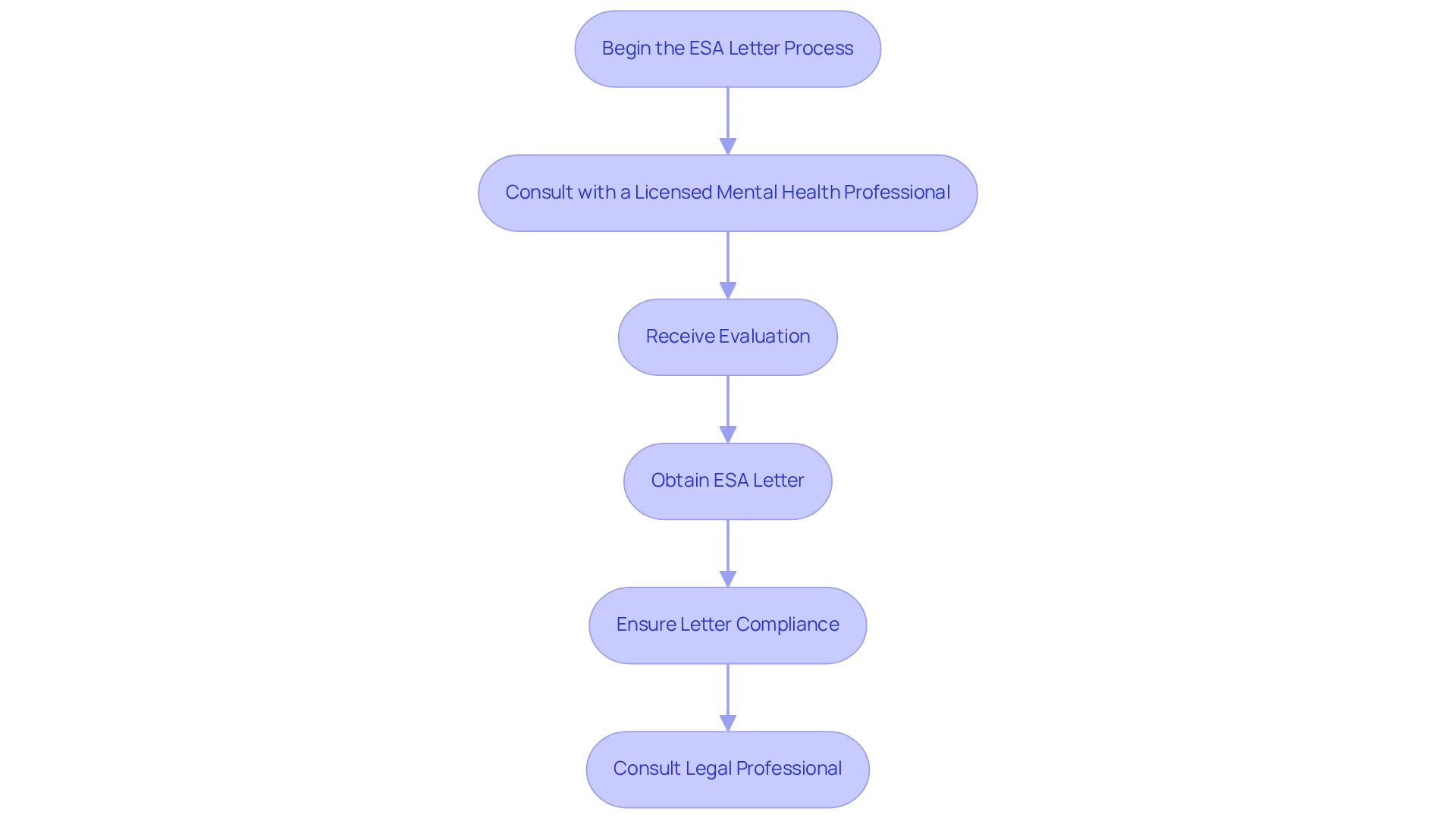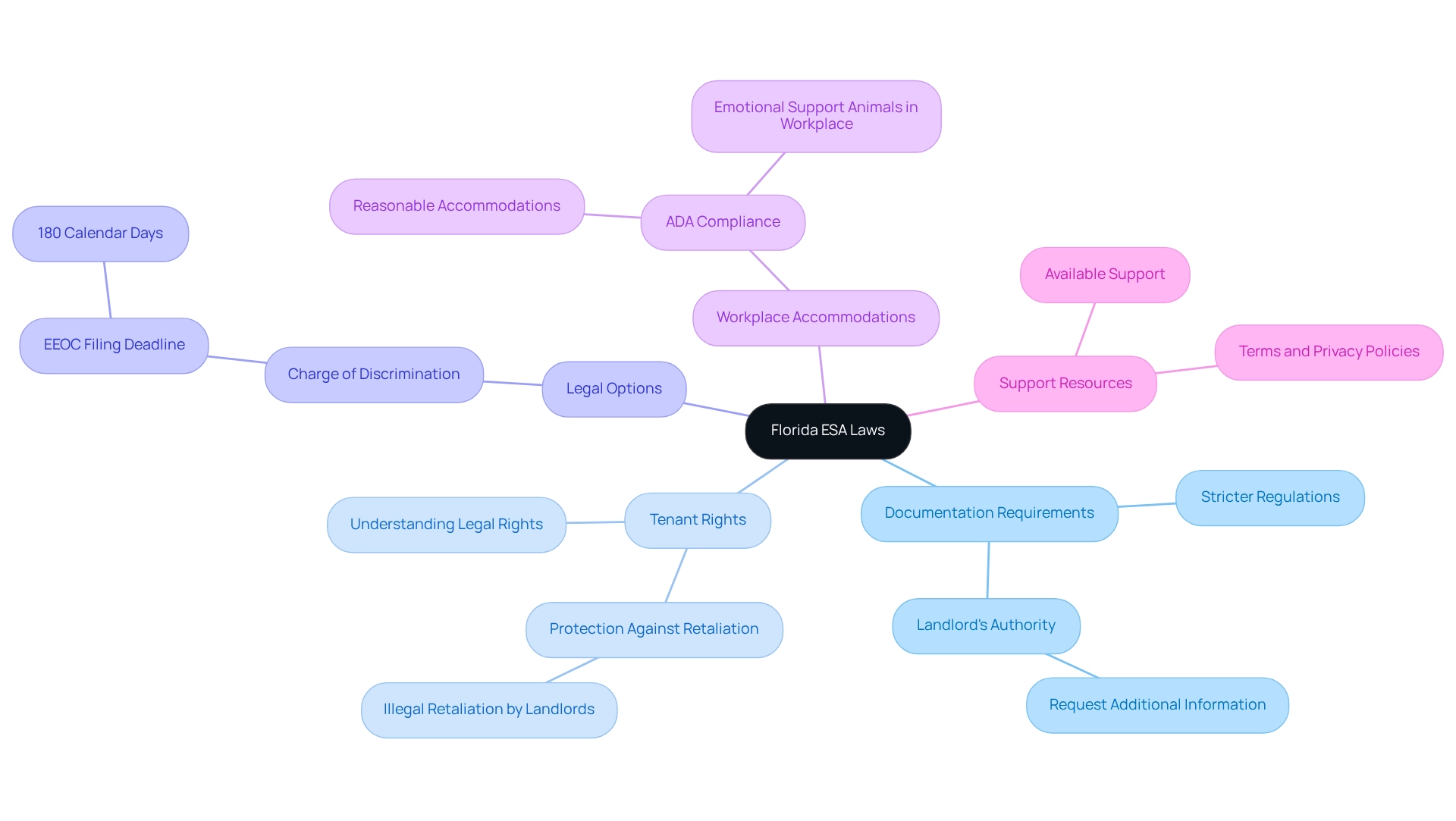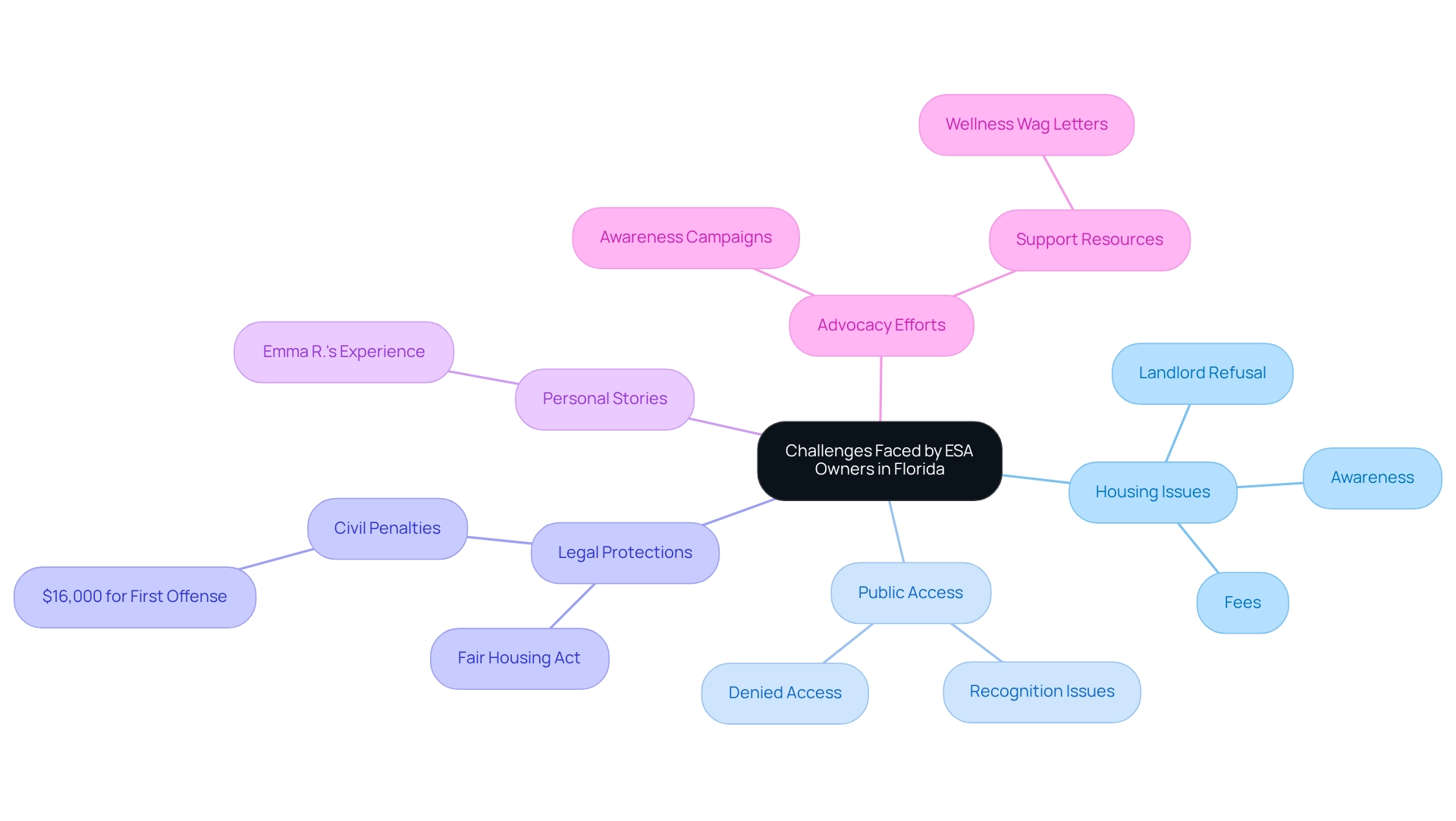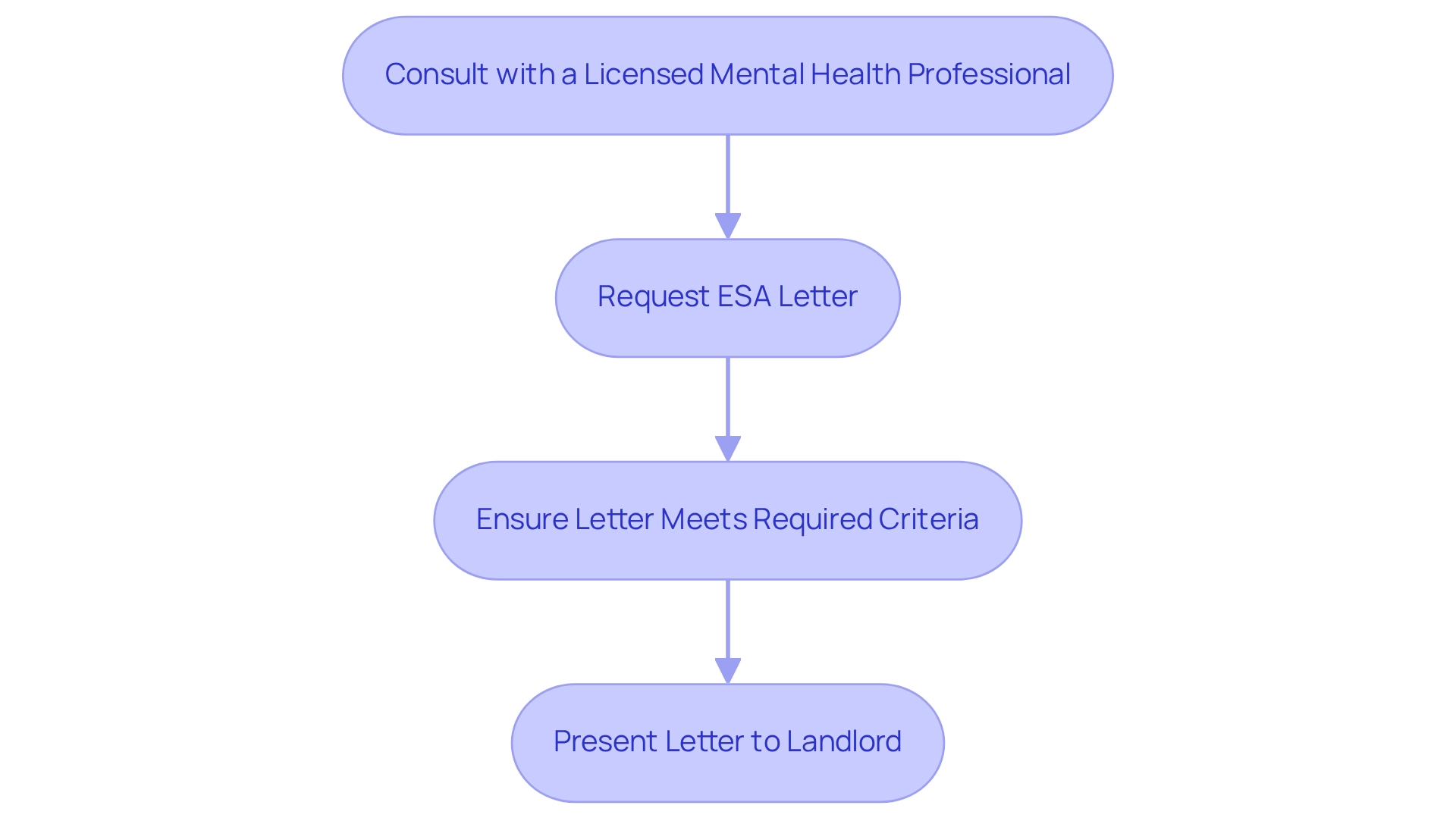

7 Essential Facts About Emotional Support Animal Florida Laws
by Lena Park
Last updated: July 10, 2025
Verified and Approved by:
Angela Morris,
MSW, LCSW
Fact Checked

Overview
The article titled “7 Essential Facts About Emotional Support Animal Florida Laws” aims to shed light on the crucial legal framework and requirements surrounding emotional support animals (ESAs) in Florida. It recognizes the emotional challenges faced by individuals with mental health issues, emphasizing the importance of obtaining valid ESA documentation from licensed professionals. This step is vital for ensuring legal protections under the Fair Housing Act. The article outlines the rights of ESA owners, including:
- Housing accommodations
- Travel regulations
while compassionately addressing the obstacles they encounter in navigating these laws. Ultimately, it serves as a supportive guide, reassuring readers that help is available to them.
Introduction
In Florida, many individuals are grappling with emotional challenges that can feel overwhelming. The growing recognition of the therapeutic benefits of Emotional Support Animals (ESAs) is a beacon of hope for those seeking comfort and companionship. Unfortunately, navigating the complexities of obtaining legitimate ESA letters can add to their stress. In fact, there has been a notable 30% increase in the issuance of these letters over the past year, reflecting the urgent need for support.
Wellness Wag stands as a compassionate ally in this journey, offering a streamlined platform for residents to efficiently and effectively secure their ESA letters. By providing personalized consultations with licensed professionals, Wellness Wag ensures that individuals receive the guidance they need. The prompt delivery of official documentation addresses the pressing concerns of those facing housing restrictions or travel challenges due to their mental health conditions.
As the legal landscape surrounding ESAs continues to evolve, it is crucial for individuals to understand their rights and the requirements for ESA ownership. This knowledge empowers them to navigate this complex terrain with confidence and clarity. Remember, you are not alone in this journey; there is support available to help you find the comfort and companionship that an ESA can provide.
Wellness Wag: Streamlined ESA Letter Services for Florida Residents
At Wellness Wag, we understand the emotional challenges faced by many Florida residents dealing with mental health issues and the role of an emotional support animal Florida. The journey toward finding support can often feel overwhelming, especially when navigating housing restrictions or travel difficulties. That’s why we provide a streamlined platform for obtaining Emotional Support Animal (ESA) letters, designed to offer compassionate assistance tailored to your unique needs.
The process begins with a brief evaluation to ascertain eligibility, allowing us to customize our services to meet individual emotional assistance needs. Following this initial step, clients engage in a personalized consultation with licensed medical professionals who genuinely care about your well-being. Once you place an order, you will receive a confirmation email detailing your purchase, ensuring you feel supported every step of the way.
After receiving authorization, clients can expect to obtain their official ESA letter within 24 hours. This timely assistance is crucial for those who face housing restrictions or travel difficulties due to mental health concerns. In fact, recent trends show a significant 30% rise in the number of emotional support animal Florida letters issued over the past year, highlighting an increasing acknowledgment of the therapeutic advantages of companion animals. Many Florida residents have successfully navigated housing restrictions by obtaining their emotional support animal Florida letters through Wellness Wag, allowing them to keep their beloved pets in pet-restricted accommodations. We believe that pets can provide invaluable emotional support, and we are here to help you secure that connection.
To further enhance your confidence in our services, we offer a money-back guarantee and interest-free payment plans, reinforcing the legitimacy and accessibility of what we provide. With over 50,000 patients served, Wellness Wag has established itself as a trusted resource for individuals navigating the complexities of emotional support animal Florida regulations, including protections under the Fair Housing Act (FHA) and Air Carrier Access Act (ACAA). Remember, you are not alone in this journey. We are here to support you and help you find the emotional assistance you deserve.
Florida Law: Definition of Emotional Support Animals
Under Florida law, an emotional support animal Florida is recognized as a companion that provides emotional support to individuals grappling with mental health conditions. Unlike service animals, ESAs do not need specialized training to perform specific tasks; their main purpose is to offer comfort and companionship, which can greatly ease symptoms of anxiety, depression, and other emotional disorders. This distinction is crucial for those seeking legal protections and accommodations in housing and travel.
Recent updates to Florida law highlight the significance of obtaining valid documentation for an emotional support animal Florida from licensed professionals. It is important to note that providing false ESA documentation is considered a misdemeanor offense. Legal experts emphasize that inadequate assistance and documentation often fail to meet legal requirements, reinforcing the necessity for authentic emotional support animal Florida letters to ensure access to housing and travel accommodations.
Statistics reveal that approximately 1 in 5 adults in the U.S. experience mental illness each year, many of whom may be eligible for ESA letters. Real-world examples, such as the case study titled “Consequences of Fraudulent ESA Documentation,” illustrate how ESAs provide essential emotional support and the legal ramifications of fraudulent claims. These examples underscore the role of ESAs in enhancing the quality of life for individuals facing mental health challenges. Understanding these legal definitions and protections, especially under the Fair Housing Act and Air Carrier Access Act, is vital for those looking to advocate for their rights.
If you have questions or concerns about this Privacy Policy, please feel free to reach out by sending an email to [email protected]. For those interested in obtaining legitimate ESA letters, consider connecting with Wellness Wag’s telehealth services for compassionate assistance.
Requirements for Obtaining an ESA Letter in Florida
In Florida, obtaining a valid emotional support animal Florida letter involves demonstrating a genuine need for emotional assistance stemming from a mental health condition. This journey typically begins with a consultation with a licensed mental health professional who carefully evaluates your unique circumstances. The ESA letter, which must be signed and dated by the provider, should include their license number and contact information. To ensure compliance with housing and travel regulations, it is essential that the letter clearly states your need for an ESA.
Many individuals face emotional challenges that can feel overwhelming. Recent studies show that emotional assistance animals significantly alleviate symptoms of mental health issues, enhancing both emotional resilience and physical well-being. In fact, those who engage in the consultation process often experience a high success rate in obtaining ESA letters, with many reporting a marked improvement in their overall well-being after receiving their documentation. Research indicates that emotional support animals (ESAs) can play a vital role in enhancing the lives of their guardians, illustrating the profound connection between emotional support and overall health.
Furthermore, the laws regarding emotional support animal Florida allow several ESAs to be validated by a licensed healthcare provider for specific disabilities, reflecting a growing recognition of the therapeutic benefits of pet companionship. As Tiffany Love, a Tampa Real Estate Partner, insightfully notes, “To avoid concerns, fraud, abuse, and ensure proper processes are followed, it is important to consult a legal professional knowledgeable about the latest rules and regulations surrounding both the documentation needed and the accommodations required under the federal and state laws.” As the landscape of ESA regulations evolves, it is crucial for individuals to stay informed about the latest requirements and seek guidance from knowledgeable legal professionals to navigate the complexities of documentation and accommodations effectively.
Moreover, Wellness Wag offers streamlined online ESA letters, ensuring compliance with necessary documentation requirements. With flexible payment plans starting as low as $32.25, their services are designed to be accessible to a broader audience, providing a supportive solution for those in need.

Rights of ESA Owners Under Florida Law
In Florida, holders of emotional support animals are afforded essential protections under the Fair Housing Act, which explicitly prohibits discrimination against individuals with disabilities. This important legislation mandates that landlords provide reasonable accommodations for tenants with emotional assistance pets, even in properties where no-pet rules typically apply. Importantly, ESA custodians cannot be charged additional fees or deposits for their pets, ensuring that financial barriers do not impede access to vital emotional support.
Understanding these rights is crucial for individuals seeking to live harmoniously with their emotional assistance companions, free from discrimination. Unfortunately, recent statistics reveal a troubling rise in discrimination cases against emotional support animal owners, which underscores the need for awareness and advocacy. For instance, submitting false documentation for an emotional assistance creature is considered a misdemeanor offense, highlighting the importance of having legitimate paperwork. Encouragingly, a growing number of property owners are now accommodating emotional support animal requests, reflecting a shift towards greater acceptance and understanding of the role emotional support animals play in mental health. Moreover, Florida’s legal framework emphasizes the necessity for valid documentation from licensed healthcare professionals to qualify for ESA status. This requirement serves to uphold the integrity of ESA laws and protects legitimate ESA owners from potential misrepresentation issues, which could result in penalties under state law. It’s also worth noting that while service dogs are not mandated to be certified or registered, obtaining certification can enhance credibility and ensure that the service dog meets specific training standards. Service dog handlers enjoy full public access rights under the Americans with Disabilities Act (ADA), allowing them to bring their service dogs into public spaces such as restaurants, shops, libraries, and public transportation.
A significant case study illustrates that misrepresentation of service animals is classified as a second-degree misdemeanor, reinforcing the importance of adhering to legal standards. Successful case studies demonstrate that many owners of emotional support animals have effectively navigated housing challenges by asserting their rights under the Florida Fair Housing Act, showcasing the critical role of proper documentation and legal knowledge. As the landscape for emotional support animal rights continues to evolve, staying informed about the legal protections available is essential for ESA owners in Florida. This knowledge not only empowers individuals but also fosters a more inclusive environment for those who rely on the companionship of their emotional assistance animals. As noted by ESA Doctors, they can assist in evaluating whether an ESA is right for you and, if you qualify, can provide you with the necessary documentation to present to your landlord.
Service Animals vs. Emotional Support Animals: Key Differences
Understanding the difference between service creatures and emotional support animals (ESAs) is essential, especially for those navigating the complexities of mental health challenges. Service creatures, particularly dogs trained to assist individuals with disabilities, enjoy rights under the Americans with Disabilities Act (ADA). They can accompany their handlers in all public spaces, including restaurants and stores, which can be a comforting thought for those who rely on their support. While there is no legal requirement for service dogs to be certified or registered, obtaining certification from recognized organizations can lend credibility and assure that the service dog has received proper training.
On the other hand, emotional support animals provide comfort and companionship but lack the specialized training to perform specific tasks. This distinction means that ESAs do not have the same legal protections in public spaces, which can lead to confusion and frustration for their guardians. It’s heartbreaking to think that many ESA owners may not fully grasp their rights. A recent survey found that only 30% of owners of emotional support animals in Florida are aware of their rights under state law. This significant knowledge gap can create barriers when trying to access public spaces or housing options, where service dogs are welcomed even in pet-restricted settings.
The ongoing debate surrounding the legal status of service creatures versus ESAs adds to this confusion. Legal experts point out that while service creatures are recognized under federal legislation, ESAs are primarily protected under housing regulations, such as the Fair Housing Act. This distinction is crucial for guardians of emotional support animals in Florida, particularly those living in pet-restricted environments, as it impacts their ability to seek necessary support. Real-world examples highlight these challenges vividly. Imagine an ESA handler facing difficulties when trying to enter a restaurant that does not acknowledge their pet’s status, while a service dog would be granted entry without question. Dr. Tasha Holland-Kornegay, a licensed professional counselor, emphasizes the importance of the bond between humans and animals in providing emotional support, underscoring the need to recognize these differences.
As discussions around animal-assisted support continue to evolve, it is vital for ESA guardians to stay informed about their rights and the legal framework surrounding emotional support animals. Resources like Wellness Wag, which has assisted over 50,000 patients, offer invaluable support for ESA caretakers. They provide valid ESA letters and help clients navigate these challenges, ensuring they understand their rights and obtain the necessary documentation. The positive testimonials from clients reflect their commitment to customer satisfaction and reinforce the credibility of the information provided, offering hope and reassurance to those in need.
Recent Changes to Florida ESA Laws
Recent changes to Florida’s emotional support animal Florida laws have introduced stricter regulations regarding the documentation required for ESAs, which can feel overwhelming for those seeking support. Landlords now have the authority to request additional information from a tenant’s treatment provider to substantiate the need for an ESA. This adjustment aims to mitigate fraudulent claims while ensuring that legitimate ESA holders in Florida retain their rights, a crucial aspect for individuals who rely on their emotional support animal Florida for comfort and stability.
It’s important to remember that while service dogs are not legally required to be certified or registered, obtaining certification can provide credibility and ensure that the service dog meets specific training standards. This can be particularly reassuring for ESA owners navigating complex housing situations. According to recent statistics, employees must submit a Charge of Discrimination to the EEOC within 180 calendar days of discrimination related to service creatures. This highlights the legal options available to ESA holders facing discrimination, empowering them to advocate for their rights.
Legal experts emphasize that understanding these regulations is essential for owners of an emotional support animal Florida to effectively navigate housing and travel accommodations. Attorney Diana Chaikin notes, “Keep in mind that retaliation by a landlord in response to a HUD allegation is illegal,” reinforcing the importance of tenant rights and the need for individuals to feel secure in their living situations.
Furthermore, a case study on emotional assistance creatures in the workplace demonstrates that under the Americans with Disabilities Act (ADA), employers must offer reasonable accommodations for disabled employees. This may involve permitting emotional assistance creatures in the workplace, which can significantly enhance the well-being of employees. As the landscape of ESA regulations changes, remaining informed will enable individuals, especially working professionals, to advocate for their rights and preserve the therapeutic advantages that an emotional support animal in Florida offers.
It’s also vital for users to accept the site’s terms and privacy policies to utilize the services offered, ensuring they are aware of their responsibilities in this context. Remember, you are not alone in this journey; support is available, and understanding these changes can help you navigate your path with confidence.

Challenges and Discrimination Faced by ESA Owners in Florida
ESA holders in Florida face significant challenges, particularly regarding housing and public access. Despite the protections offered by the Fair Housing Act, many landlords still refuse to accommodate emotional support animals (ESAs), often citing unfounded concerns or imposing additional fees. This issue is further complicated by a lack of awareness among property owners about their legal responsibilities.
In public spaces, ESAs frequently encounter recognition issues, as numerous establishments do not acknowledge them as valid assistance animals. This can result in denied access, adding to the difficulties faced by those who depend on their animals for emotional support. Advocacy groups stress that discrimination against ESA holders is not just a legal issue; it’s a societal one. Many individuals share personal stories of being denied housing or access to public places. Emma R., an ESA holder, recounted her experience of being refused housing despite having proper documentation, highlighting the emotional toll such discrimination can inflict.
Mental health professionals stress the necessity of recognizing these challenges. They note that the bond between an ESA and the alleviation of mental health symptoms is crucial. As Daniel, the Director of Property Management, remarked, “The medical professional must connect the tenant’s possession of the animal with an alleviation of at least one symptom of the disability.”
Moreover, recent statistics indicate that landlords could face civil penalties of up to $16,000 for violating the Fair Housing Act, yet many persist in enforcing restrictive policies. While landlords can implement specific pet-related rules to reduce risks, they cannot discriminate against tenants who require ESAs. This ongoing struggle underscores the vital need for ESA guardians to be informed about their rights and prepared to advocate for themselves when facing discrimination.
To help navigate these challenges, ESA caretakers in Florida can obtain their emotional support animal Florida letters through Wellness Wag’s efficient online platform, ensuring they have the necessary documentation to protect their rights. It is essential for ESA owners to be aware of their legal protections and to seek support when confronted with discrimination.

Housing Laws for Emotional Support Animals in Florida
Florida housing regulations require that landlords make provisions for emotional support animals in Florida when tenants provide a legitimate ESA letter from a licensed mental health professional. Under the Fair Housing Act, landlords are prohibited from charging pet fees or deposits for ESAs, and they must permit these animals in no-pet housing. However, it is common for landlords to request documentation to verify the necessity of an ESA. A recent study indicates that approximately 70% of landlords in Florida require such documentation, highlighting the importance of having a well-prepared ESA letter.
Emotional Support Animals provide essential comfort to students with disabilities, alleviating symptoms related to their conditions and promoting a better quality of life in residential settings. It is essential to note that therapy dogs are not considered service dogs under the ADA and do not have the same legal rights. This distinction is crucial for ESA holders to understand their specific rights and obligations. Legal specialists stress that comprehending these laws is crucial for ESA caretakers to safeguard their rights. For instance, successful cases have emerged where ESA holders effectively advocated for their rights in housing disputes, often resulting in favorable outcomes. Advocacy groups emphasize that landlords are obligated to comply with these regulations, and failure to do so can lead to legal repercussions.
In 2025, Florida’s housing regulations keep evolving, strengthening the rights of ESA holders. Statistics show that compliance with housing laws for emotional support animals in Florida is improving, with a growing number of landlords becoming aware of their obligations. This change is crucial for cultivating an inclusive atmosphere for individuals depending on the emotional support of their pets. As the U.S. Department of Housing and Urban Development outlines, understanding these rights is vital for ESA owners to navigate housing challenges effectively.
To obtain an ESA letter, follow these steps:
- Consult with a licensed mental health professional to discuss your needs.
- Request an ESA letter that details your condition and the need for the companion.
- Ensure the letter meets the required criteria, including the professional’s contact information and license details.
- Present the letter to your landlord when applying for housing.
Furthermore, individuals pursuing an ESA can seek advice from organizations focused on ESAs for assistance in locating appropriate companions or ensuring their letters fulfill required standards, as emphasized in the case study ‘Improving Your ESA Application.

Travel Regulations for Emotional Support Animals in Florida
Traveling with an emotional support animal in Florida can be a challenging experience, especially for those who depend on their companionship for emotional stability. The Air Carrier Access Act (ACAA) allows emotional support animals (ESAs) to accompany their handlers on flights, but recent updates have significantly altered this landscape. Many airlines, including Air Canada, are now categorizing ESAs differently than service animals, which has led to a reduction in their travel rights. As we approach 2025, it becomes increasingly important for ESA holders to check specific airline policies and requirements before embarking on their journeys to avoid any potential disruptions.
Unfortunately, Air Canada no longer recognizes emotional support pets, allowing only psychiatric service dogs (PSDs) to travel with appropriate documentation. This includes completing a U.S. DOT Service Animal Air Transportation Form, which requires vaccination details and certification that the PSD is trained in specific assistive functions. Travelers must also notify the Medical Assistance Desk 48 hours prior to their flight and may find it beneficial to have a PSD letter for a smoother check-in experience. While pet fees can vary based on flight type, it’s worth noting that there are no breed restrictions for service dogs, although snub-nosed breeds may face limitations. In Florida, the recognition of emotional support animals by airlines has decreased, with only about 30% currently allowing them on flights. This shift reflects the evolving landscape of airline policies and underscores the importance of understanding the latest regulations. For many, the emotional support provided by an emotional support animal is invaluable, and although some airlines may still permit ESAs, they often require an authentic ESA letter to confirm the animal’s role in offering emotional support. Real-world experiences highlight the difficulties faced by ESA caregivers. For instance, a traveler with anxiety found that possessing an ESA letter facilitated a more seamless trip, allowing them to board with their companion despite initial concerns regarding airline regulations. This flexibility can significantly enhance comfort during travel, especially for those navigating mental health challenges.
Aviation experts recommend that ESA owners take the time to familiarize themselves with the updates to the Air Carrier Access Act and consult directly with airlines like Air Canada to ensure compliance with current travel rules. By adopting this proactive approach, they can better manage the challenges of traveling with emotional support animals and enjoy a more positive travel experience.
Documenting Your Need for an Emotional Support Animal in Florida
In Florida, the journey to obtaining an emotional support animal Florida begins with a crucial step: securing a valid ESA letter from a licensed mental health professional. This letter is not just a formality; it must clearly outline your mental health condition and express the vital need for your ESA in providing emotional support. Key elements of this letter include the provider’s signature, date, contact information, and license number. Having proper documentation is essential, as it empowers ESA holders to assert their rights in housing and travel situations, particularly in environments with pet restrictions.
Statistics reveal that approximately 70% of ESA holders possess valid documentation, underscoring the importance of adhering to legal requirements. Mental health professionals stress that thorough documentation not only legitimizes your need for an ESA but also contributes significantly to your overall well-being. While ESAs do not require specialized training like service animals, it is advisable to ensure they receive fundamental obedience and socialization training, along with routine veterinary care. This proactive approach enhances the well-being of your emotional support animal Florida, ensuring they can effectively assist you in your emotional journey.
Understanding the specific requirements for emotional support animal Florida letters is crucial for anyone seeking emotional assistance. It involves being aware of the legal framework that mandates colleges and universities to permit ESAs in housing, even in no-pet policies. Additionally, for travel purposes, completing the U.S. DOT Service Animal Air Transportation Form is essential when flying with your ESA. This form requires vaccination details, handler and trainer information, and a certification that your ESA is trained in specific assistive functions. Moreover, if you’re traveling with Air Canada, it’s important to complete their required documentation, which includes similar details about your ESA’s training and health. By following these guidelines, you can navigate the complexities of ESA documentation and secure the emotional support you truly deserve.
Conclusion
Emotional Support Animals (ESAs) have emerged as a vital source of comfort and companionship for those navigating the challenges of mental health in Florida. As the demand for legitimate ESA letters continues to rise, Wellness Wag shines as a trusted partner, offering a compassionate process that prioritizes individual needs and ensures the prompt delivery of essential documentation. The notable increase in ESA letters issued over the past year reflects a growing recognition of the profound therapeutic benefits these animals provide.
Understanding the legal landscape surrounding ESAs is crucial for individuals striving to secure housing and travel accommodations effectively. Florida law offers important protections for ESA owners under the Fair Housing Act, making it essential for individuals to possess valid ESA letters to assert their rights. Awareness of these rights empowers ESA owners to advocate for themselves against discrimination, ensuring they can coexist with their emotional support animals without facing unnecessary hurdles.
As laws and regulations evolve, staying informed is vital for ESA owners to uphold their rights and the support their animals offer. By utilizing resources like Wellness Wag, individuals can not only obtain the necessary documentation but also gain valuable insight into their legal protections. The journey toward emotional well-being is significantly supported by the companionship of ESAs, and with the right tools and knowledge, individuals can confidently navigate the complexities of ESA ownership.
Frequently Asked Questions
What is an emotional support animal (ESA) in Florida?
An emotional support animal in Florida is recognized as a companion that provides emotional support to individuals dealing with mental health conditions. Unlike service animals, ESAs do not require specialized training; their primary purpose is to offer comfort and companionship.
How does Wellness Wag assist individuals in obtaining an ESA letter?
Wellness Wag provides a streamlined platform for obtaining ESA letters, beginning with a brief evaluation to determine eligibility. Clients then have a personalized consultation with licensed medical professionals. Once an order is placed, clients receive a confirmation email and can expect their official ESA letter within 24 hours.
What legal protections do ESAs have under Florida law?
ESAs are protected under the Fair Housing Act (FHA) and the Air Carrier Access Act (ACAA), allowing individuals to access housing and travel accommodations with their emotional support animals.
What steps are involved in obtaining an ESA letter through Wellness Wag?
The process involves an initial evaluation, a personalized consultation with a licensed mental health professional, and receiving the ESA letter, which must be signed, dated, and include the provider’s license number and contact information.
What are the consequences of providing false ESA documentation in Florida?
Providing false ESA documentation is considered a misdemeanor offense in Florida, highlighting the importance of obtaining legitimate ESA letters from licensed professionals to ensure compliance with legal requirements.
What resources does Wellness Wag provide to enhance accessibility for clients?
Wellness Wag offers a money-back guarantee, interest-free payment plans starting as low as $32.25, and has served over 50,000 patients, making their services more accessible to individuals seeking emotional support.
What is the significance of the recent trends regarding ESA letters in Florida?
There has been a significant 30% increase in the number of ESA letters issued in Florida over the past year, indicating a growing recognition of the therapeutic benefits of companion animals for mental health support.
How can individuals contact Wellness Wag for more information or assistance?
Individuals can reach out to Wellness Wag by sending an email to [email protected] for questions or concerns regarding their services or obtaining ESA letters.
Certify Your Emotional Support Animal Today

Why You Can Rely on Us?
At Wellness Wag, we believe your pet deserves care rooted in both science and compassion. Each article is carefully researched, written in clear language for pet owners, and then reviewed by qualified professionals to ensure the information is evidence-based, current, and practical for real-life care. Our goal is to help you feel confident in making informed decisions about your pet’s health and well-being.
Reviewed by
Angela Morris, MSW, LCSW
Angela is a licensed clinical social worker with 20 years of experience in patient advocacy and community mental health. She has assisted numerous clients with ESA evaluations and brings a deep understanding of disability accommodations, ensuring that all information is accurate, supportive, and practical.

Written by :
Lena Park
Last Updated :
July 10, 2025












